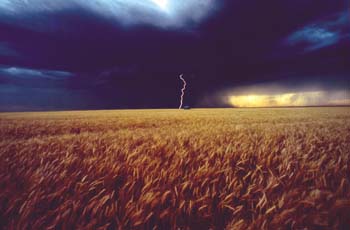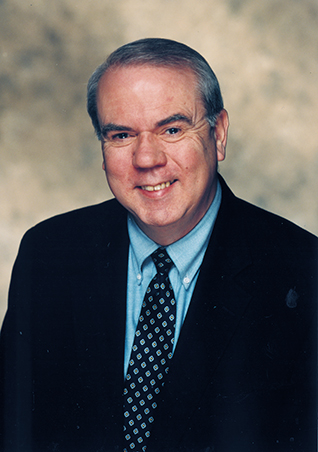
Beauty of Kansas: This photo by Cotton Coulson introduced J. Cliff Tarpy’s
National Geographic article about his home state 15 years ago.
A Pennsylvanian newly graduated from Wichita State talks about “home” and east-west ties with National Geographic writer and native Kansan Cliff Tarpy '68.
As a native eastern Pennsylvanian, when I first moved to Kansas two years ago, I remember saying to myself: I’m never going to stop looking up. Sure, Pennsylvania has mountains and the rolling farmland of Amish country, and the brilliance of the fall season is perhaps rivaled only by New England, but there’s nothing like a Kansas sunset, and there’s nothing like driving out toward Hutchinson and being able to say, literally, that you can see for miles.
In Pennsylvania, “seeing for miles” is nothing more than a figure of speech; we have a tendency to get nervous about open space, and in the 26 years I spent there, I watched most of my beloved farmland become housing developments and shopping centers, and the mountains become infiltrated by land developers interested in turning our lakes into mini resorts.
But out here in Kansas, people still seem to have respect for the land, and when I decide to get away for a little while and leave town, I don’t have to worry about running into the next one any time soon. For at least the next 20 miles, I can take in the colors of a landscape uninterrupted by skyscapers, the solace of feeling as though, at last, I have room to breathe, and knowing that, in a world where we often feel so insignificant, simple, quiet, ordinary pleasures still exist. When I finally do get to the next town, people still remember to smile and say hello, even to a stranger.
That’s the beauty of a place like this.
And that’s precisely the beauty James “Cliff” Tarpy ’68 touched on 15 years ago in “Home to Kansas,” one of many articles he’s written for National Geographic since he joined the Washington, D.C., staff in 1978.
“The state of Kansas cultivates many things,” he wrote in that article, “not the least of them thick hides, patience, and a sense of humor… When you come from Kansas, you get used to a polite, uncertain stare, an Easterner’s story about that endless drive to Colorado — and, of course, a little joke about Dorothy and the Wizard of Oz.”
One thing’s for certain — the state of Kansas is still cultivating a sense of humor in me. When I return to Pennsylvania to visit family and friends, people seem to think it politic to ask if I have a pair of ruby slippers yet (no), whether or not I’ve seen a tornado (close enough), whether or not I intend to chase a tornado (not in this lifetime), and when the heck I’m coming back East (no time soon). The simple truth is, I like Kansas.
So does Cliff Tarpy. I had the opportunity to catch up with him recently on one of those rare days when he was relaxing at home for a little while. His work with National Geographic has always kept him busy, and since being promoted to senior writer in 1999, it seems he’s been especially on-the-go.
Despite a rather hectic daily schedule, I immediately detected a sense of warmth, confidence and humor in his voice. He’s currently preparing to leave for an assignment in New Mexico where he will research an article dealing with the Pueblo Indians, an article he describes as “a very Geographic-type story.” He’s especially looking forward to exploring the state that’s called “The Land of Enchantment.”

As one might suspect, Tarpy’s job has taken him to many different lands, although not all of his experiences have been what he would call “enchanting.”
While on a photo shoot in Honduras, he experienced a little plane trouble: “We were in Tegucigalpa [the capital city] and getting ready to fly to the other side of the country,” Tarpy says. “It was this little airport, and they pulled the plane out of the weeds. We get up above the clouds and open our box lunches, when suddenly the cockpit fills with the smell of gasoline. The pilot looked down through the clouds — this is sophisticated piloting — and got us back to the airport. He said to us, ‘As soon as we get this plane back, I’m going to have it fixed.’” Tarpy sighs. “That’s usually something you think of before you take the plane up in the air.”
While on assignment in China in 1999, he had a less harrowing experience, but a unique one nonetheless. “It’s not as if I’m a huge dino fan, but I was given the assignment to ghostwrite. My job was to research the photographs, which is what my department does.”
However, Tarpy soon discovered that there was more involved than research — like the Chinese government. “We had a touchy moment in the northeast. What I call ‘The Fossil Police’ showed up and presented us with this form we had to fill out before we could continue. We had an interpreter with us, and everything eventually got straightened out. The Chinese government jealously — and rightfully so — protects their patrimony.”
While Tarpy’s job with National Geographic has taken him to exquisitely beautiful places he won’t soon forget — such as Venice and the South of France — he returns to Kansas “fairly frequently,” he says, to visit his two sisters and his nieces and nephews.
Wichita is, after all, where he was born and raised, and he has fond memories of his days as an undergraduate in English. He actually began taking courses at WSU while still a high school student at West High.
“I had some good, tough instructors who made me wince at the time. I remember one instructor — I can’t recall his name — actually spoke in perfect paragraphs, as though he was repeating something already written. Literature may not equip you for journalism, but it does enrich your life. It was good grounding for the kind of writing I do now.”
As a former English major myself who very often finds herself flirting with journalism, I had to agree with Tarpy. When he discovered I was from the Allentown area in Pennsylvania, he advised me that Kansas and Pennsylvania have a very interesting connection.
Back in the days of “Bleeding Kansas,” a distant relative of his, Andrew H. Reeder, was Kansas’ first territorial governor. It turns out that Reeder was originally from Easton, a city fairly close to Allentown. A Kansan in the make or not, I do get nostalgic when I hear someone utter the names of familiar towns from my past. But this wasn’t about nostalgia. He had a story for me.
The way Tarpy tells it, Andrew Reeder had a bit of a hard time. He knew he was a marked man for his anti-slavery stance, and being a marked man, he knew he had to come up with an escape plan. The escape plan came in handy one night over a game of chess.
“He dressed up as an Irish woodcutter,” Tarpy says, “and because of this disguise, he was able to make a quick getaway back to Easton, Pennsylvania. After the Civil War, he came back to Kansas and visited the guy he had been playing chess with the night of his escape. The guy had left the board exactly as it had been when Reeder took off. The two of them sat down and they finished the game.”
A former Kansas boy’s tall-tale yarn? It was at that moment I wished I could see Tarpy on the other end of the line. I wanted to see if he was grinning. I wanted to see if his eyes were twinkling. But the miles between us made that impossible, and in retrospect, I do have one regret:
I didn’t ask him who won.





